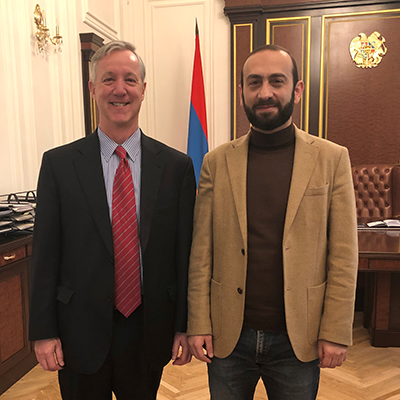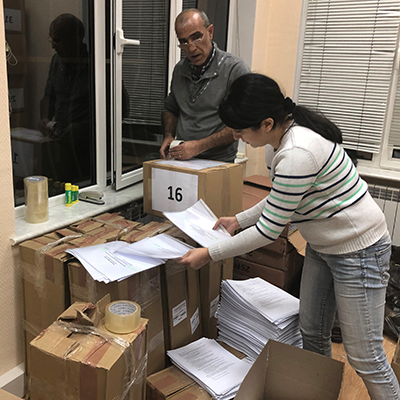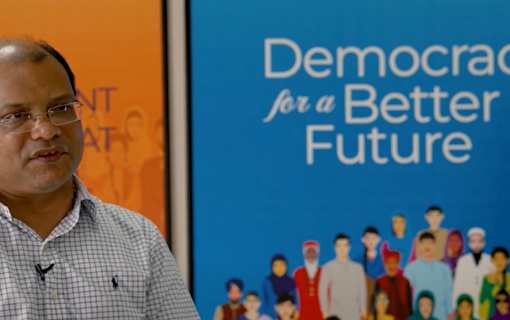
Critical Assistance to Early Parliamentary Elections in Armenia
In late spring 2018, Armenia witnessed a change in government following peaceful street protests. The country’s new leadership announced a state program that prioritized a revision of the electoral framework and called for snap parliamentary elections. As a result of these political changes, the International Foundation for Electoral Systems (IFES) re-established itself in Armenia in June 2018 through a Rapid Response initiative, “Strengthening Armenia’s Political Transition,” funded by the United States Agency for International Development (USAID). Currently, IFES is implementing a four-year USAID-funded successor project, “Strengthening Electoral Processes and Political Accountability in Armenia.” Through the project, IFES provides technical assistance to improve the institutional capacity of election management bodies, support electoral reform, strengthen campaign finance oversight, improve the practice of electoral dispute resolution, and support civic and voter education.
After the approval of street protest leader Nikol Pashinyan as prime minister by the Armenian National Assembly, the political situation in the country remained fluid. Capitalizing on the strong public support once again demonstrated during the Yerevan municipal elections in late September 2018, Pashinyan decided to take steps to hold snap parliamentary elections sooner than the initial spring 2019 timeframe. Pashinyan’s symbolic resignation and the parliament’s failure to elect a new prime minister were necessary constitutional precursors to the dissolution of the National Assembly on November 1 and the call for early parliamentary elections on December 9, 2018.
One of the key concerns was the capacity of the Central Election Commission (CEC) of Armenia to organize not one but two elections in short order and possibly under a revised election code – one for the Yerevan city Council of Elders and the other for the National Assembly. Given the accelerated timetable pursued by the new government, it became clear that the CEC would struggle to train members of lower-level election commissions in time, particularly if both elections were held in close proximity. As the only international election assistance provider on the ground and funded to provide support, IFES took the lead in working with the CEC to design training plans for poll workers and a voter education and motivation campaign for both the local and national elections.
Despite the tight timeline, IFES was able to mobilize its resources to provide critical technical assistance to the CEC in preparation for the snap parliamentary elections, much the way it had for the Yerevan city Council of Elders elections. For both special elections, IFES designed and conducted a training-of-trainers (ToT) workshop and assisted the CEC in developing and conducting subsequent poll worker trainings, which resulted in the training of 20,000 poll workers for the parliamentary elections. The live training was supported by a training manual designed and printed by IFES and voter education posters for every polling station.
Upon agreement with the CEC, IFES provided technical, logistical and financial support to the ToT initiative. Sixty-one trainers were trained from November 20-24, with IFES developing new training modules for the precinct election commissioners (PEC) and supporting the printing and delivery of 21,000 PEC-member manuals. In addition to the PEC manuals, training materials included trainers’ guides, a compilation of training exercises and posters on voting and polling station closing procedures. All materials were packed at the IFES office in Yerevan for each of the 38 Territorial Election Commissions. PEC training support also included the development of individualized deployment plans for each trainer and transportation to the regions to conduct the training.
Between November 25 and December 7, IFES supported approximately 700 training sessions at 55 locations throughout the country for 20,000 PEC members. The participation at the PEC trainings countrywide was 79 percent – the highest participation rate among all trainings conducted previously for national elections. Ninety-four percent of all PEC chairs and 90 percent of PEC secretaries participated in the training.
In addition, to address the need to educate voters on the secrecy of the vote and spread the anti-vote-buying messages, IFES supported the development, production and airing of a series of public service announcements (PSAs). The PSAs were produced in less than two weeks and aired on public and commercial TV channels in Armenia.
"With international assistance, the CEC provided training for PEC members on voting and counting procedures. The quality of the training sessions was overall positively evaluated by the ODIHR [Election Observation Mission].” – Organization for Security and Co-operation in Europe’s ODIHR report
Noteworthy in the Organization for Security and Co-operation in Europe’s Office for Democratic Institutions and Human Rights (ODIHR) report of preliminary conclusions was the positive assessment of election management bodies’ work on Election Day, stating that “voting was assessed positively in 99 percent of observations reflecting the adherence of the PECs to procedures.” The report added an overall favorable assessment to the quality of training, stating that “with international assistance, the CEC provided training for PEC members on voting and counting procedures. The quality of the training sessions was overall positively evaluated by the ODIHR [Election Observation Mission].”
Through its on-site presence, rapid outreach to the CEC and other governmental and non-governmental partners, IFES has positioned itself to be a key, non-partisan interlocutor offering comparative, international good practice as the inexperienced new authorities in Armenia forge a new path toward democratic elections and governance amid a polarized and conflicted political environment.












